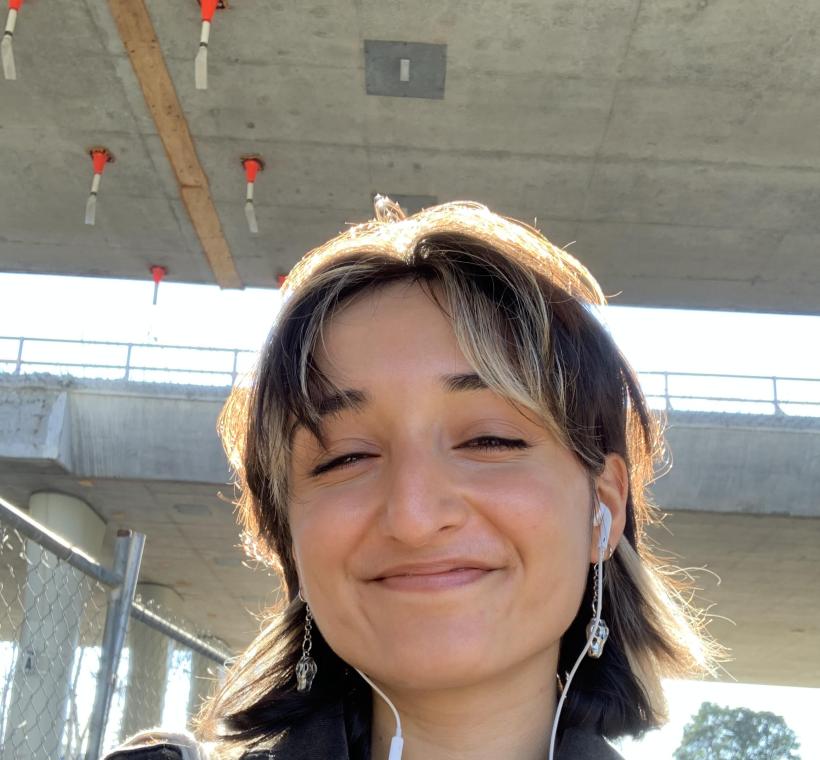
Manola Secaira
Tell us about yourself:
I'm Manola, an environmental journalist currently working for CapRadio, the NPR station in Sacramento. I've been doing audio stories here for the last year and a half, covering topics like extreme weather in the state, the worsening impacts of climate change, and how communities are responding. Before that, I worked at a PBS affiliate in Seattle where I covered both Indigenous Affairs and environmental justice (topics that frequently overlap with one another, as Tribes play a big role in environmental policy throughout the country).
More recently, I've been interested in exploring projects where I create audio stories rooted in the perspectives of people who share my background — specifically, queer communities of color. I want to create stories that don't necessarily prioritize explaining their contents to people outside of our community; instead, I want to do storytelling that does not need to explain itself constantly but instead digs in, with nuance and complexity, to the needs of the community it wants to serve.
A piece of yours or project (in any medium) that you'd like to share.
Protecting Molok Luyuk, a haven of biological diversity in Northern California on CapRadio
What draws you to storytelling?
On the simplest level, I love talking to people I wouldn’t otherwise get a chance to sit with and hear their stories. It’s something I feel grateful for whenever I get a chance to interview someone for work.
I'm often drawn to stories involving environmental justice, especially because conversations in the American environmental movement have historically excluded communities of color from them (even though these communities, as is now more known, bear the brunt of the damage caused by pollution, climate change, etc). I'm also passionate about elevating the voices of people who may not otherwise see themselves prioritized in news coverage; in many cases, the people I've interviewed for stories have told me that they've never spoken to a journalist before. Whenever I hear this, I make sure they know my priority is to do them justice, to tell their story the right way, and make sure they're comfortable throughout the entire process.
What excites you the most about being a New Voices Scholar?
As someone who has been a writer for a while but is newer to the audio space, I’m really excited to be part of a cohort of other passionate audio storytellers. It’s already been amazing just to talk to the other brilliant storytellers in the group and bounce off ideas. It also helps that I’ve been paired with a great mentor who’s willing to talk me through some of my dream project ideas and how to bring them to life.
What’s playing on your radio/audio streaming service right now?
I’ve been listening to a lot of MUNA lately, so not surprising that I’ve been into their podcast Gayotic. I’ve also a latecomer to the podcast You’re Wrong About and have been enjoying digging through the years-spanning trove of episodes there (including a more recent episode about lesbian seagulls, which is definitely a favorite).
What’s the most underrated tool (technical or not) that you use in your creative process?
When I’m sitting down to write a script, sometimes I find it difficult to write in a way that sounds human. It’s kind of an obvious trick at this point, especially in audio, but whenever I’m stuck, I talk to a friend about what I’m working on and take note of how I’m explaining it to them. Usually, the way I’d explain it in a normal, human conversation is the way that it should be written.
What is something you want to see more of in the industry?
I’ve often found that storytellers of color are forced into positions where they’re made to be the representative of their entire community, even though no one can represent an entire community on their own. On a personal level, I’ve found that this dynamic has kept me from doing the deeper storytelling that I know our community deserves – storytelling that does not need to explain itself constantly but instead digs in with nuance and complexity. I’d like to see more opportunities for that, and fewer spaces where any one person is made to feel like they’re the “only one.”
What are your radio/audio inspirations and why?
Kaitlin Prest has to be a big one. Her podcast, The Heart, and other audio projects from Prest’s art company Mermaid Palace were formative for me on a personal level and also what made me fall in love with audio. Another early inspiration for me was Jad Abumrad, especially his podcast Dolly Parton’s America — a different vibe, but I remember being impressed with the way he told a well-known story in a way that felt new.
Anything else you'd like to add?
While I’ve been a reporter for a long time and plan to continue that work, I’m also interesting in more creative audio storytelling opportunities in the future!